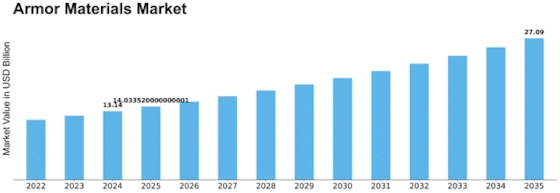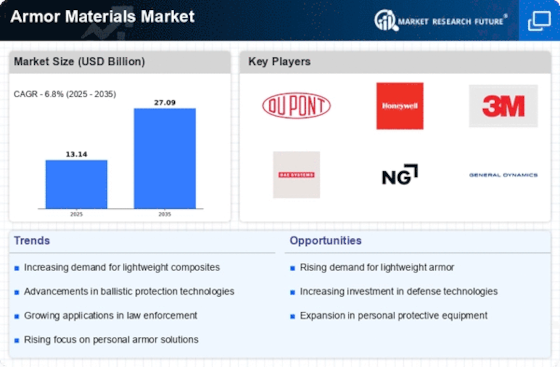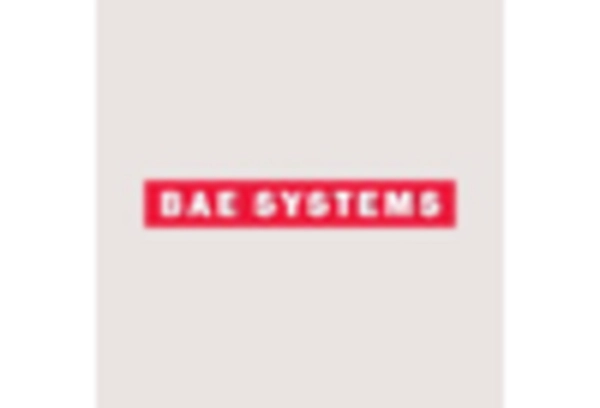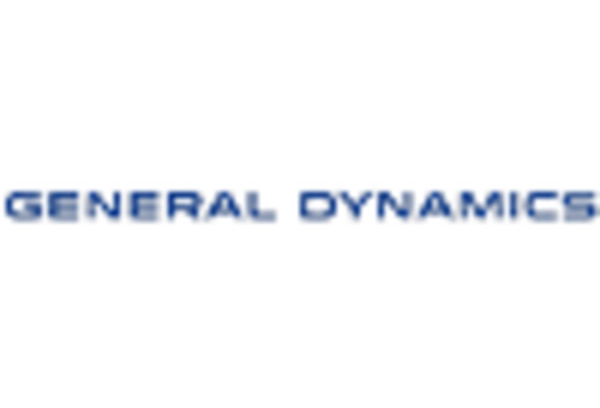Armor Materials Size
Armor Materials Market Growth Projections and Opportunities
The size of the armor materials market is influenced by many factors that shape its dynamics and growth trajectory. The escalating worldwide security concerns are among the major drivers in the market, increasing demand for sophisticated armor materials. Moreover, countries all over the world are prioritizing boosting their defence capacities thereby driving the market ahead. Also, it has led to a focus on personal protection equipment owing to increasing terror activities and asymmetric warfare which has supported armor materials sector.
Technological advancements are important in shaping the market landscape. Through continuous research and development new innovative materials with higher protective capabilities have been created. Therefore, this incessant evolution in material science is key to meeting ever changing requirements from modern warfare and security operations. Furthermore, there is growing interest in developing lightweight but tough materials as militaries seek to enhance soldier mobility while still ensuring safety.
Armor Materials Market Size was valued at USD 11.5 Billion in 2022. The Armor Materials market is expected to grow from USD 12.3 Billion in 2023 to USD 20.8 Billion by 2032 at a CAGR of 6.80% during the forecast period.
Additionally, defence budgets allocated by governments significantly influence the armour materials market as they impact on procurement decisions. Market dynamics can be directly affected by fluctuation on defense spending with huge budgets being incurred for enhanced investments into advanced armour solutions while tight budgets can make a slow growing market or even reduce total sales due to budget constraint issues especially with regard for military acquisitions such as armors systems designed for ground vehicles like APCs or MRAPs etc… On other hand , high national security threat levels lead nations towards enhancement of their defense capabilities resulting into increased demand of armored vehicles within these economies.
The industrial ecosystem too plays a vital role in influencing the armor material markets globally & parameters like presence of solid defense industry besides government & private partnership result into cutting edge armor material development & production. Efforts to leverage skills and resources through research partnerships with private entities, joint ventures and technology transfer agreements in defense organizations usually facilitate armor materials advancement.
Moreover, the demand for sustainable and eco-friendly solutions is growing as environmental considerations gain importance in the armor materials market. In order to maintain high levels of performance while reducing negative effects on ecosystems, manufacturers are actively seeking out such alternatives. Consequently, it resonates well with global movements towards promoting environmentally friendly practices across separate sectors including this one namely defense.
Market competition and regulatory frameworks also play a crucial role in shaping the armor materials landscape. Intense rivalry among major industry players fuel innovations and technological advancements that yield many types of armour solutions. Stringent regulations as well as certification processes influence the adoption of particular types of armors so that they meet strict effectiveness & safety standards.
Moreover, the increasing complexity in the armor materials market emanates from both changing threats patterns and new technologies being developed . As an adversary develops ways to bypass existing defence measures, such should immediately be addressed by innovative and more advanced materials used in armour production. This is why dynamic responses are needed from this sector concurrently making them necessary for modern warfare or security scenarios.



















Leave a Comment